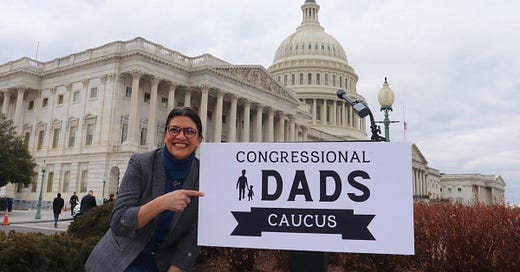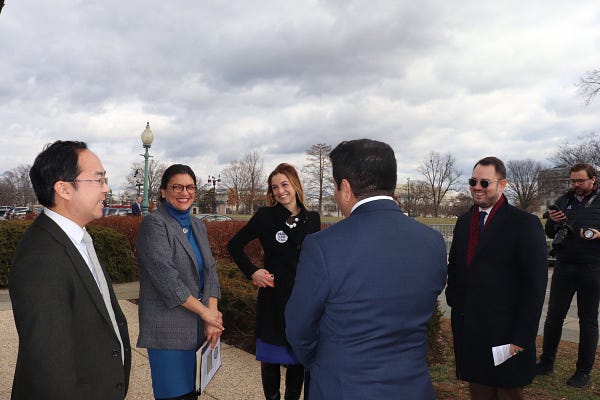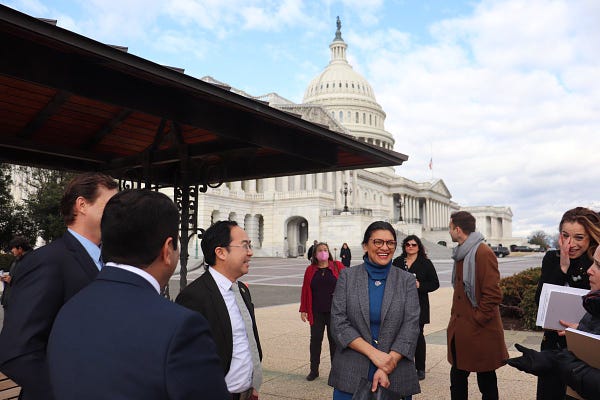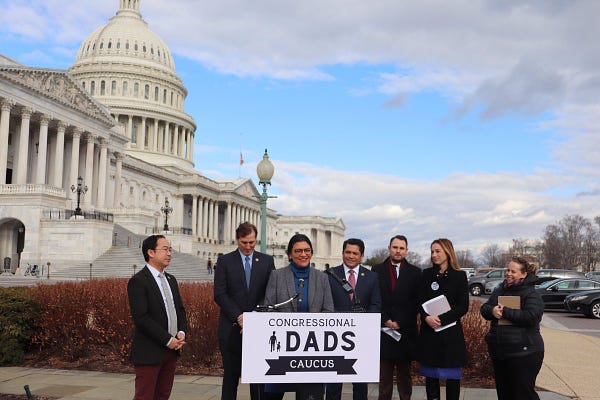Two relatively small things happened this week that strike me as being important, and I am worried that they, and the larger story they tell, might get lost in the midst of this week’s terrible news. So ignore this at will, and I will put down a marker.
At a press conference on Thursday, Representatives Jimmy Gomez (D-CA), Rashida Tlaib (D-MI), Daniel Goldman (D-NY), Andy Kim (D-NJ), Joaquin Castro (D-TX), Jamaal Bowman (D-NY), Joe Neguse (D-CO), Eric Swalwell (D-CA), Ruben Gallego (D-AZ), Colin Allred (D-TX), Mike Levin (D-CA), Josh Harder (D-CA), Raul Ruiz (D-CA), and Senator Rob Menendez (D-NJ) announced they have formed the Congressional Dads Caucus.
Ironically, the push to create the caucus came from the Republicans’ long fight over electing a House speaker, as Gomez and Castro, for example, were photographed taking care of their small children for days as they waited to vote. That illustration of men having to adjust to a rapidly changing work environment while caring for their kids “brought visibility to the role of working dads across the country, but it also shined a light on the double standard that exists,” Gomez said. "Why am I, a father, getting praised for doing what mothers do every single day, which is care for their children?"
He explained that caucus “is rooted in a simple idea: Dads need to do our part advancing policies that will make a difference in the lives of so many parents across the country. We’re fighting for a national paid family and medical leave program, affordable and high-quality childcare, and the expanded Child Tax Credit that cut child poverty by nearly half. This is how we set an equitable path forward for the next generation and build a brighter future for our children.”
The new Dads Caucus will work with an already existing caucus of mothers, represented on Thursday by Tlaib.
Two days before, on Tuesday, January 24, the Women’s Bureau of the U.S. Department of Labor released its initial findings from the new National Database of Childcare Prices. The brief “shows that childcare expenses are untenable for families throughout the country and highlights the urgent need for greater federal investments.”
The findings note that higher childcare costs have a direct impact on maternal employment that continues even after children leave home, and that the U.S. spends significantly less than other high-wage countries on early childcare and education. We rank 35th out of 37 countries in the Organisation for Economic Co-operation and Development (OECD) made up of high-wage democracies, with the government spending only about 0.3% of gross domestic product (GDP) compared to the OECD average of 0.7%.
These two stories coming at almost the same time struck me as perhaps an important signal. The “Moms in the House” caucus formed in 2019 after a record number of women were elected to Congress, but in the midst of the Trump years they had little opportunity to shift public discussion. This moment, though, feels like a marker in a much larger pattern in the expansion of the role of the government in protecting individuals.
When the Framers wrote the U.S. Constitution, they had come around to the idea of a centralized government after the weak Articles of Confederation had almost caused the country to crash and burn, but many of them were still concerned that a strong state would crush individuals. So they amended the Constitution immediately with the Bill of Rights, ten amendments that restricted what the government could do. It could not force people to practice a certain religion, restrict what newspapers wrote or people said, stop people from congregating peacefully, and so on. And that was the opening gambit in the attempt to use the United States government to protect individuals.
But by the middle of the nineteenth century, it seemed clear that a government that did nothing but keep its hands to itself had almost failed. It had allowed a small minority to take over the country, threatening to crush individuals entirely by monopolizing the country’s wealth. So, under Presidents Abraham Lincoln and Ulysses S. Grant, Americans expanded their understanding of what the government should do. Believing it must guarantee all men equal rights before the law and equal access to resources, they added to the Constitution the Thirteenth, Fourteenth, and Fifteenth Amendments, all of which expanded, rather than restricted, government action.
The crisis of industrialization at the turn of the twentieth century made Americans expand the role of the government yet again. Just making sure that the government protected legal rights and access to resources clearly couldn’t protect individual rights in the United States when the owners of giant corporations had no limits on either their wealth or their treatment of workers. It seemed the government must rein in industrialists, regulating the ways in which they did business, to hold the economic playing field level. Protecting individuals now required an active government, not the small, inactive one the Framers imagined.
In the 1930s, Americans expanded the job of the government once again. Regulating business had not been enough to protect the American people from economic catastrophe, so to combat the Depression, Democrats under President Franklin Delano Roosevelt began to use the government to provide a basic social safety net.
Although the reality of these expansions has rarely lived up to expectations, the protection of equal rights, a level economic playing field, and a social safety net have become, for most of us, accepted roles for the federal government.
But all of those changes in the government’s role focused on men who were imagined to be the head of a household, responsible for the women and children in those households. That is, in all the stages of its expansion, the government rested on the expectation that society would continue to be patriarchal.
The successful pieces of Biden’s legislation have echoed that history, building on the pattern that FDR laid down.
But, in the second half of his Build Back Better plan—the “soft” infrastructure plan that Congress did not pass—Biden also suggested a major shift in our understanding of the role of government. He called for significant investment in childcare and eldercare, early education, training for caregivers, and so on. Investing in these areas puts children and caregivers, rather than male heads of households, at the center of the government’s responsibility.
Calls for the government to address issues of childcare reach back at least to World War II. But Congress, dominated by men, has usually seen childcare not as a societal issue so much as a women’s issue, and as such, has not seen it as an imperative national need. That congressional fathers are adding their voices to the mix suggests a shift in that perception and that another reworking of the role of the government might be underway.
This particular effort might well not result in anything in the short term—caucuses form at the start of every Congress, and many disappear without a trace—but that some of Congress’s men for the first time ever are organizing to fight for parental needs just as the Department of Labor says childcare costs are “untenable” strikes me as a conjunction worth noting.
—
Notes:
https://www.dol.gov/agencies/wb/topics/childcare
https://www.dol.gov/newsroom/releases/wb/wb20230124
https://www.dol.gov/sites/dolgov/files/WB/NDCP/WB_IssueBrief-NDCP-final.pdf
https://gomez.house.gov/news/documentsingle.aspx?DocumentID=2737
https://thehill.com/homenews/house/3831875-house-lawmakers-launch-congressional-dads-caucus/







At a time when so many businesses are woefully short-staffed, one would think that making childcare more affordable would appeal to Republicans. But we know that’s a pipe dream.
Childcare and parental leave are light years more progressive in other well-off countries. But then again most of those counties have strong central governments that care about improving the lives of their citizens.
My love and life partner died when our children were five and eight years old. Many people insisted that I should pass the kids off to aunts or other relatives and start my life over again. This struck me as cold hearted and crass, so I raised them alone. It is a touch job in the best of circumstances, but is was my choice to have children, and my gender did not give me a free ticket out of the situation. More and more men are seeing parenthood as a shared responsibility, as it should be. For good reason I see the care of our young to be a sacred duty and have never regretted my decision. The government needs to "man up" for this reality in order to insure the future health of our children and our country.